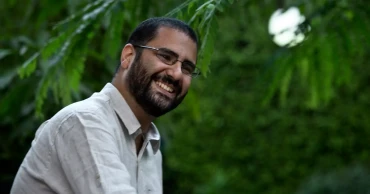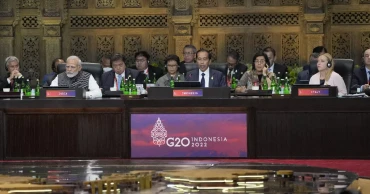World
Imprisoned Egyptian activist calls off hunger strike
The family of imprisoned Egyptian activist Alaa Abdel-Fattah said Tuesday they received a letter from him saying he has ended his hunger strike.
In a statement, the family said that Abdel-Fattah's mother, Laila Soueif, received a short note in her son’s handwriting via prison authorities. The letter is dated Monday. In it, he asks her to come for her monthly visit to him in prison on Thursday.
‘‘I’ve broken my strike. I’ll explain everything on Thursday,’’ the letter read.
Read more: Amnesty warns COP27 could be dominated by jailed Egyptian-British activist's hunger strike
The family has not seen Abdel-Fattah since the last pre-allotted visit a month ago and has not been given information on his condition. In the note, Abdel-Fattah asks his mother to bring a cake to celebrate his 41st birthday, which is on Friday. The meetings, conducted behind a glass barrier, usually last for around 20 minutes.
“From the letter, it is clear that his psychological state “is good,” Soueif told The Associated Press, referring to her son's reference to his birthday. “But I won’t be reassured until I see him.”
Fears had been mounting over Abdel-Fattah's life since he stopped intake of all food, then stopped drinking water on Nov. 6, escalating a months-long partial hunger strike to pressure for his release. His strike was timed to coincide Egypt’s hosting of the international climate summit to draw attention to his case and those of other political prisoners. His partial hunger strike began on April 2, after which he was consuming only 100 calories a day
The news comes a day after the renowned dissident announced the end of his water strike on Monday via a similar handwritten letter delivered to the family.
The prison authorities began a medical intervention on Abdel-Fattah last Thursday, but authorities did not provide details on the nature of medical intervention raising concerns among the family that he was being force-fed.
“I feel cautiously relieved now knowing that at least he’s not on hunger strike but my heart won’t really be settled until Thursday,’’ his sister Mona Seif said in the family's statement.
Read more: COP27 climate talks begin as world grapples with multiple crises
Abdel-Fattah’s hunger strike has drawn attention to Egypt’s heavy suppression of speech and political activity. Since 2013, Egyptian President Abdel-Fattah el-Sissi’s government has cracked down hard on dissidents and critics, jailing thousand and virtually banning all protests.
Abdel-Fattah is one of Egypt's most prominent pro-democracy activists and has spent most of the last decade in prison. He is currently serving a five-year sentence on charges related to sharing a Facebook post. He rose to prominence during the 2011 pro-democracy uprisings — known as the Arab Spring — that swept through the Middle East. In Egypt, the uprising toppled the country’s long-time autocratic President Hosni Mubarak.
Turkey makes more arrests in connection with deadly bombing
Turkish police have apprehended more suspects in connection with the bombing of a bustling pedestrian avenue in Istanbul that killed six people and wounded several dozen others, bringing the number of people in custody to 50, Turkey’s justice minister said Tuesday.
Sunday’s explosion targeted Istiklal Avenue — a popular thoroughfare lined with shops and restaurants — and was a stark reminder of bombings in Turkish cities between 2015 and 2017 that crushed the public’s sense of security.
Turkish authorities blamed the attack on the outlawed Kurdistan Workers’ Party, or PKK, as well as Syrian Kurdish groups affiliated with it. The Kurdish militants groups have, however, denied involvement.
Read more: Turkey detains Syrian suspect in deadly Istanbul bombing
Police carried out raids in Istanbul several hours after the blast and detained 48 people, including a Syrian woman who is suspected of leaving a TNT-laden bomb at Istiklal. Police said the woman, identified as Ahlam Albashir, had crossed into Turkey from Syria illegally and has admitted to carrying out the attack.
On Tuesday, Justice Minister Bekir Bozdag said the number of suspects in custody has increased to 50, but did not provide details. The state-run Anadolu Agency said police on Tuesday detained two brothers, identified as Ammar J. and Ahmed J.
Ammar J. was allegedly tasked with helping Albashir flee Istanbul to neighboring Greece after the attack, while Ahmed J. allegedly drove a suspect who is still at large, to Edirne province, near the border with Bulgaria, Anadolu reported.
“Turkey continues with its fight against terrorism with determination,” the independent T24 news website quoted the minister as saying. “No terrorist organization will succeed in any kind of plot against Turkey.”
Around 80 people were hospitalized following the attack, of whom at least 57 have been discharged. Six of the wounded were in intensive care and two of them were in serious condition, officials said.
Read more: Bomb rocks avenue in heart of Istanbul; 6 dead, dozens hurt
The six killed in the blast were members of three families and included two girls, ages 9 and 15.
The Kurdistan Workers’ Party, or PKK, has fought an armed insurgency in Turkey since 1984. The conflict has killed tens of thousands of people since then.
Ankara and Washington both consider the PKK a terrorist group, but disagree on the status of the Syrian Kurdish groups, which have been allied with the U.S. in the fight against the Islamic State group in Syria.
Turkey has been infuriated by U.S. support for the Kurdish militia in Syria, and on Monday, Interior Minister Suleyman Soylu said he rejects messages of condolences from Washington.
President Recep Tayyip Erdogan, however, posted on social media a chart with the flags of all countries that have offered their condolences — including the American flag — with a message expressing his “heartfelt gratitude” to all states and institutions that have “shared our grief."
Battle for Kherson was D-Day-like watershed: Zelenskyy
Ukrainian President Volodymyr Zelenskyy on Tuesday likened the recapture of the southern city of Kherson to the Allied landings in France on D-Day in World War II, saying both were watersheds on the road to eventual victory.
Speaking via video link to a Group of 20 summit in Indonesia, Zelenskyy said Kherson's liberation from eight months of Russian occupation was “reminiscent of many battles in the past, which became turning points in the wars."
“It’s like, for example, D-Day — the landing of the Allies in Normandy. It was not yet a final point in the fight against evil, but it already determined the entire further course of events. This is exactly what we are feeling now,” he said.
Read more: G20: Zelenskyy, Biden trying to persuade world leaders to further isolate Russia
The retaking of Kherson was one of Ukraine’s biggest successes in the nearly 9-month-old Russian invasion and dealt another stinging blow to the Kremlin. But large parts of eastern and southern Ukraine remain under Russian control and fighting continues. Ukrainian authorities on Tuesday reported another civilian death, from Russian shelling, in eastern Ukraine — adding to the invasion's heavy toll of many tens of thousands killed and wounded.
The liberation of Kherson — the only provincial capital that Moscow had seized — has sparked days of celebration in Ukraine and allowed families to be reunited for the first time in months. But as winter approaches, the city's remaining 80,000 residents are without heat, water or electricity, and short on food and medicine.
Still, U.S. President Joe Biden called it a “significant victory” for Ukraine. Speaking on the sidelines of the G-20 summit, Biden added: "We’re going to continue to provide the capability for the Ukrainian people to defend themselves.”
In his address to the G-20, Zelenskyy called for the creation of a special tribunal to try Russian military and political figures for the crime of aggression against Ukraine, and the creation of an international mechanism to compensate Kyiv for wartime deaths and destruction.
Zelenskyy referred to the G-20 meeting as “the G-19 summit,” adhering to Kyiv’s line that Russia should be excluded from the grouping.
Read more: Zelenskyy promises Ukraine will win as Russia redoubles effort
“Everywhere, when we liberate our land, we see one thing — Russia leaves behind torture chambers and mass burials. … How many mass graves are there in the territory that still remains under the control of Russia?" Zelenskyy pointedly asked.
Ukrainian authorities say there are signs of atrocities emerging in Kherson, just as in other liberated areas.
Zelenskyy made a triumphant surprise visit on Monday to Kherson. He hailed the Russian retreat from the southern city as the “beginning of the end of the war,” but also acknowledged the heavy price Ukrainian soldiers are paying in their grinding effort to push back Russia's invasion forces.
World population at 8 billion: What new challenges will it create?
The world's population is projected to hit an estimated 8 billion people on Tuesday (November 15, 2022), according to a United Nations projection, with much of the growth coming from developing nations in Africa.
Among them is Nigeria, where resources are already stretched to the limit. More than 15 million people in Lagos compete for everything from electricity to light their homes to spots on crowded buses, often for two-hour commutes each way in this sprawling megacity. Some Nigerian children set off for school as early as 5 a.m.
And over the next three decades, the West African nation's population is expected to soar even more: from 216 million this year to 375 million, the U.N. says. That will make Nigeria the fourth-most populous country in the world after India, China and the United States.
“We are already overstretching what we have — the housing, roads, the hospitals, schools. Everything is overstretched," said Gyang Dalyop, an urban planning and development consultant in Nigeria.
Also read: World population to reach a milestone 8 billion on Nov 15, India to overtake China next year
The U.N.'s Day of 8 Billion milestone Tuesday is more symbolic than precise, officials are careful to note in a wide-ranging report released over the summer that makes some staggering projections.
G20: As Lavrov watches on, UK PM Sunak criticises Russia’s “barbaric” war
As the G20 summit begins in Indonesia’s Bali, UK Prime Minister Rishi Sunak has denounced Russia’s “barbaric” war in Ukraine.
Sunak said the “Putin regime stifled domestic dissent” and constructed “a veneer of validity only through violence.”
Read: Sunak won’t go to UN climate conference: UK
Vladimir Putin decided not to attend, and Russian Foreign Minister Sergei Lavrov was in the room listening to Sunak’s remarks, BBC reported.
Sunak also stated that he thought China presented a “systematic challenge” to the UK’s values, but he did not make it clear whether he would reclassify China as a “threat” to national security, like his predecessor Liz Truss had.
Read: G20: Zelenskyy, Biden trying to persuade world leaders to further isolate Russia
G20: Zelenskyy, Biden trying to persuade world leaders to further isolate Russia
Ukrainian President Volodymyr Zelenskyy joined U.S. President Joe Biden in trying to persuade other leaders of the world’s largest economies to further isolate Russia diplomatically and economically over its invasion of Ukraine, despite a souring global financial outlook that has tested many nations’ resolve.
The call to stand up to Russia and defend Ukraine’s sovereignty in both symbolic and substantive ways came Tuesday at the meetings of the Group of 20 summit in Indonesia.
Inflation and slowing economies are weighing on several of the countries that imposed penalties on Russia for starting the nine-month war. Higher costs for energy and food have destabilized business activity around the world, as much of Europe prepares to brave the winter without imports of Russian natural gas.
Read: European leader calls on world, China to pressure Russia
In opening the summit, Indonesian President Joko Widodo impressed on the gathering what’s at stake.
“If the war does not end, it will be difficult for the world to move forward,” Widodo said. “We should not divide the world into parts. We must not allow the world to fall into another cold war.”
In a video address, Zelenskyy reiterated 10 conditions for ending the conflict that began in February, among them a complete withdrawal of Russian troops and full restoration of Ukrainian control of its territory.
“Ukraine should not be offered to conclude compromises with its conscience, sovereignty, territory and independence,” he said. “Ukraine has always been a leader in peacekeeping efforts, and the world has witnessed it. And if Russia says that it supposedly wants to end this war, let it prove it with actions.”
A senior U.S. administration official, speaking on the condition of anonymity to discuss the summit, said Tuesday that the summit’s final communique will make clear that “most” of the nations condemn Russia’s invasion in Ukraine and the toll it has taken on global food and energy supplies.
Read: UN Security Council rejects Russian request for bioweapons investigation
It’s unclear how many nations would embrace the tough language or whether the document would refer to Russia’s actions as a “war” — a phrase Moscow has sought to avoid, despite the devastating losses inflicted and sustained by its military.
The European Council president, Charles Michel, urged other global powers to intensify pressure on Russia over its war against Ukraine, including Moscow’s biggest supporter, China. Michel said Tuesday that the summit was crucial to stopping Moscow’s push “to use food and energy as weapons.”
The U.S. and its allies responded to Russia’s invasion of Ukraine with export controls and other sanctions, making it harder for Russia’s military to access key technologies and resupply with drones, artillery and other weapons.
Chinese President Xi Jinping said to the G-20 that the global economy should not on principle be weaponized.
Turkey detains Syrian suspect in deadly Istanbul bombing
Turkish police said Monday they have detained a Syrian woman with suspected links to Kurdish militants and that she confessed to planting a bomb that exploded on a bustling pedestrian avenue in Istanbul, killing six people and wounding several dozen others. Kurdish militants strongly denied any links to the bombing.
Sunday's explosion hit Istiklal Avenue, a popular thoroughfare lined with shops and restaurants that leads to Taksim Square.
“A little while ago, the person who left the bomb was detained by our Istanbul Police Department teams,” Interior Minister Suleyman Soylu announced early Monday. Police later identified the suspect as Ahlam Albashir, a Syrian citizen.
Read more: Bomb rocks avenue in heart of Istanbul; 6 dead, dozens hurt
The Istanbul Police Department said videos from around 1,200 security cameras were reviewed and raids were carried out at 21 locations. At least 46 other people were also detained for questioning.
The suspect allegedly departed the scene in a taxi after leaving TNT-type explosives on the crowded avenue, police said.
Sunday’s explosion was a shocking reminder of the anxiety that gripped Turkey when such attacks were common. The country was hit by a string of deadly bombings between 2015 and 2017, some by the Islamic State group, others by Kurdish militants who seek increased autonomy or independence.
Police said the suspect told them during her interrogation that she had been trained as a “special intelligence officer” by the outlawed Kurdistan Workers' Party, as well as the Syrian Kurdish group the Democratic Union Party and its armed wing. She entered Turkey illegally through the Syrian border town of Afrin, police said.
Read more: Turkey arrests 1, suspects Kurdish militants behind bombing
The Kurdistan Workers Party denied involvement in a statement, saying it did not target civilians. In Syria, the main Kurdish militia group, People’s Defense Units, denied any links to the suspect. The group maintained that Turkish President Recep Tayyip Erdogan was trying to gather international support for his plans to launch a new incursion into northern Syria ahead of next year’s elections.Soylu said the suspect would have fled to neighboring Greece if she hadn't been detained.
Asked about Soylu’s comments, Greek government spokesman Giannis Oikonomou reiterated Greece's condolences and stressed that the government “is steadily against any terrorist act. What happened in Istanbul is abhorrent and condemnable.”
Earlier, Soylu said security forces believe that instructions for the attack came from Kobani, the majority Kurdish city in northern Syria that borders Turkey. He said the attack would be avenged.
“We know what message those who carried out this action want to give us. We got this message,” Soylu said. “Don’t worry, we will pay them back heavily.”
Soylu also blamed the United States, claiming that a condolence message from the White House was akin to “a killer being first to show up at a crime scene.” Turkey has been infuriated by U.S. support for Syrian Kurdish groups.
In its message, the White House said it strongly condemned the “act of violence" in Istanbul, adding: “We stand shoulder-to-shoulder with our NATO ally (Turkey) in countering terrorism.”
Turkish television broadcast footage purporting to show the main suspect being detained at a house where she was allegedly hiding. It said police searching the house also seized large amounts of cash, gold and a gun.
The minister told reporters that Kurdish militants had allegedly given orders for the main suspect to be killed to avoid evidence being traced back to them.
Istanbul Gov. Ali Yerlikaya said of the 81 people hospitalized in the attack, 57 have been discharged. Six of the wounded were in intensive care and two of them were in life-threatening condition, he said. The six killed in the blast were members of three families and included children ages 9 and 15.
Funerals were held Monday for the six victims, including Adem Topkara and his wife, Elif Topkara, who had left their two young children with their aunt and were taking a stroll down Istiklal at the time of the blast.
Istiklal Avenue was reopened to pedestrian traffic at 6 a.m. Monday after police concluded inspections. People began leaving carnations at the site of the blast, while the street was decorated with hundreds of Turkish flags.
Mecid Bal, a 63-year-old kiosk owner, said his son was caught up in the blast and called him from the scene.
“Dad, there are dead and wounded lying on the ground. I was crushed when I stood up" to run, Bal quoted him as saying.
Restaurant worker Emrah Aydinoglu was talking on the phone when he heard the explosion.
“I looked out of the window and saw people running,” the 22-year-old said. “People were lying on the ground, already visible from the corner of the street (I was in). They were trying to call (for help), whether it was an ambulance or the police. All of them were shrieking and crying.”
The Kurdistan Workers' Party, or PKK, has fought an armed insurgency in Turkey since 1984. The conflict has killed tens of thousands of people since then.
Ankara and Washington both consider the PKK a terrorist group, but they diverge on the issue of the Syrian Kurdish groups, which have fought against IS in Syria.
In recent years, Erdogan has led a broad crackdown on the militants as well as on Kurdish lawmakers and activists. Amid skyrocketing inflation and other economic troubles, Erdogan’s anti-terrorism campaign is a key rallying point for him before Turkey's presidential and parliamentary elections next year.
Following the attacks between 2015 and 2017 that left more than 500 civilians and security personnel dead, Turkey launched cross-border military operations into Syria and northern Iraq against Kurdish militants, while also cracking down on Kurdish politicians, journalists and activists at home.
“In nearly six years, we have not experienced a serious terrorist incident like the one we experienced yesterday evening in Istanbul. We are ashamed in front of our nation in this regard,” Soylu said.
Turkey’s media watchdog imposed restrictions on reporting on Sunday’s explosion — a move that bans the use of close-up videos and photos of the blast and its aftermath.
Access to Twitter and other social media sites was also restricted on Sunday.
European leader calls on world, China to pressure Russia
The European Council president urged global powers Tuesday to intensify pressure on Russia over its war against Ukraine, including Moscow's biggest supporter, China, saying that this week's meeting of the world's largest economies was crucial to stopping Moscow's push "to use food and energy as weapons.”
Charles Michel, speaking to reporters on the first day of the Group of 20 meeting in Bali, said the nine-month war waged by Russia, a permanent member of the U.N. Security Council, has disrupted lives across the world, as food and energy prices surge and economies stagnate.
“Russia’s war impacts us all, no matter where we live, from Europe to Africa or the Middle East, and the single best way to end the acute crisis in food and energy is for Russia to end this senseless war and to respect the U.N. charter,” Michel said. “The Kremlin has decided to weaponize food, driving up hunger, poverty and instability.”
Read more:Biden to meet China's Xi on Monday for Taiwan, Russia talks
Europe, Michel said, is working to help Ukraine, a big food exporter before the war, increase its shipments, and is also trying to address disruptions in fertilizer supplies and rising prices. EU sanctions against Russia, he said, don’t target agricultural products, even though Russia has imposed restrictions on its own food and fertilizer products.
“This is not a battle (of) Russia against the Western part of the world. It’s a battle for the U.N. charter. It’s a battle for the international law. It's a battle for the idea that this is not acceptable to try to change by force internationally recognized borders.”
Michel said he had no plans to meet with the most senior Russian present in Bali, Foreign Minister Sergey Lavrov.
China, the world's second biggest economy, has largely refrained from public criticism of Russia’s war, although Beijing has avoided direct support of the Russians, such as supplying arms. Michel avoided direct criticism of China when asked if Beijing has shown any signs of changing its steadfast support of Russia in recent days.
Instead, he said that the G-20 meeting Tuesday and Wednesday was important to convince all nations present “to put more pressure on Russia."
After a meeting Monday between President Joe Biden and Chinese President Xi Jinping, Biden said the two leaders discussed Russia’s aggression against Ukraine and “reaffirmed our shared belief” that the use or even the threat of nuclear weapons is “totally unacceptable” — a reference to Moscow’s thinly veiled threats to use atomic weapons as its invasion of Ukraine has faltered.
Read more: UN Security Council rejects Russian request for bioweapons investigation
Michel said that Europe must make sure that it creates a different economic and political relationship with China than the one it did with Russia.
“We don't want to make the same mistakes maybe we make with Russia on fossil fuels,” which Europe was very dependent on, “with China, (where) we don't want to be too dependent for the innovative technology that we need today and that we need more in the future. That's why it's important to rebalance the relationship,” Michel said.
Jeff Bezos says he will give away most of his $124bn wealth
Amazon founder Jeff Bezos said he will give away the majority of his wealth during his lifetime, becoming the latest billionaire to pledge to donate much of his vast fortune.
Bezos, whose “real-time” worth Forbes magazine estimates at roughly $124.1 billion, made the announcement in a joint CNN interview with his girlfriend Lauren Sanchez that was released on Monday. The billionaire didn’t specify how - or to whom - he will give away the money, but said the couple were building the “capacity” to do it.
“The hard part is figuring out how to do it in a levered way,” Bezos said during the interview. “It’s not easy. Building Amazon was not easy. It took a lot of hard work and very smart teammates. And I’m finding - and Lauren’s finding - that philanthropy is very similar. It’s not easy. It’s really hard.”
Read: Forbes Real-Time Billionaires List: India’s Gautam Adani overtakes Jeff Bezos again
Bezos had been criticized in the past for not signing the Giving Pledge, the campaign launched by Bill Gates, Melinda French Gates and Warren Buffet to encourage billionaires to donate the majority of their wealth through philanthropy.
His ex-wife McKenzie Scott signed that pledge in 2019 and has since emerged as a formidable force in the world of philanthropy, showering charities throughout the country with unexpected - and often secretive - contributions. In the past three years, she’s given more than $12 billion to historically Black colleges and universities, women’s rights group and other nonprofits.
Bezos, who divorced from Scott in 2019, stepped down as Amazon CEO last year to devote more time to philanthropy and other projects. Among other donations, he’s pledged $10 billion to fight climate change as part of his Bezos Earth Fund initiative. Last year, he gave $510.7 million to charity, according to The Chronicle of Philanthropy.
Read: 3 Bangladeshi companies on Forbes list
On Saturday, Bezos and Sanchez announced they will give a no-strings-attached $100 million grant to singer Dolly Parton, who’s been praised for her philanthropic work that helped create the Moderna vaccine for COVID-19. Bezos had given a similar grant to chef José Andrés and CNN commentator Van Jones last year.
Japan to develop underwater drones to lay, remove sea mines
Japan plans to develop unmanned underwater vehicles to lay and sweep mines, aiming to attain maritime superiority in the event of a contingency near the country's southwestern Nansei Islands chain, a source close to the matter said Monday.
The plan comes as the Defense Ministry seeks to ramp up the use of drones to support missions of the ground, maritime and air branches of the Self-Defense Forces.
It is expected to be articulated in the National Security Strategy and two other key defense documents slated to be revised by the end of this year.
Along with artificial intelligence, drones are considered a game-changing technology in contemporary warfare. They are seen as effective in reducing casualties in combat while being able to destroy adversaries' war-fighting assets at a relatively low cost.
The ministry's weapons procurement arm, the Acquisition, Technology and Logistics Agency, is already producing an underwater drone that can detect mines while avoiding obstacles autonomously. The agency expects to start research and development at an early date on a model that can lay and remove mines.
The newly developed drones are aimed at deterring adversaries from landing on the Nansei Islands, as well as sweeping mines during maritime blockades, including when important sea lanes are blocked, the source said.
The island chain stretches southwest from Kagoshima Prefecture to Okinawa Prefecture. The islet group includes the Japanese-controlled, Beijing-claimed Senkaku Islands, which China calls Diaoyu, in the East China Sea.
Currently, SDF vessels and planes are used to lay mines, but such mines could be removed if adversaries track the vessels and planes via satellite and other means to estimate where they laid the mines.
With underwater drones, the government hopes the SDF will be able to lay mines without running such risks while at the same time making it difficult for adversaries to contemplate invasion using vessels and submarines.
Besides underwater drones, the government plans to acquire small aerial drones to attack invading enemies. The ministry has requested funding for the acquisition in a new budget from April.
The government is also considering developing unmanned fighters to support the country's next-generation fighter jets.



















